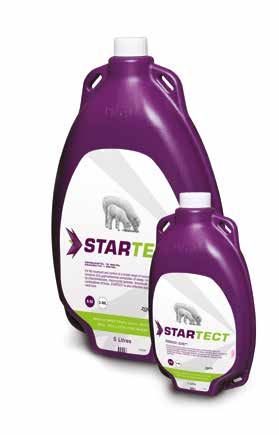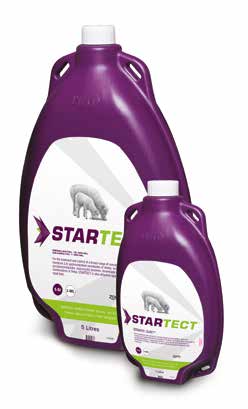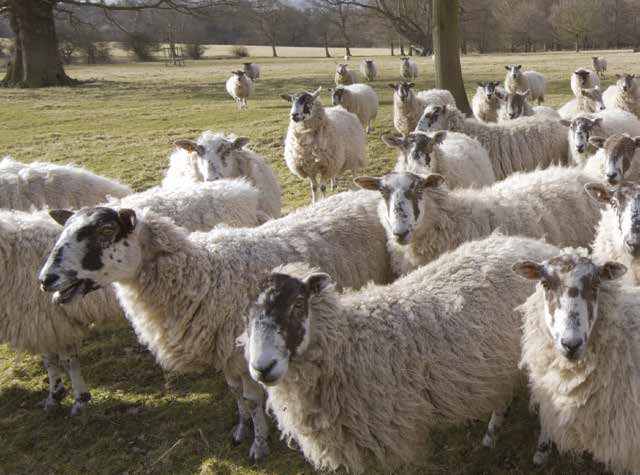Sheep-worming-the-future.info




The future of worming STARTS here!
Dual active worm control
Dual active worm control
Introducing a novel
strategy for sustainable
worm control in sheep.
STARTECT® is the first dual active wormer. It gives an additive effect for improved worm control, which can enhance animal performance.
Containing a novel active ingredient derquantel, and a potent ML abamectin it not only kills worms resistant to other products, but used routinely it can help delay wormer resistance, protecting your flock from drench failure now and into the future.
STARTECT is the only dual active wormer.
l Dual active wormers
l STARTECT active ingredients
l STARTECT key claims
l Efficacy against resistant worms
Sustainability and delayed resistance development
l Dosing guidelines


Dual active wormers
Benefits of dual active wormers: additive effects1
l Enhanced efficacy against resistant worms
If one drug fails to kill all worms, the other can kill the survivors
l Delayed resistance development
Resistance to the constituent anthelmintic classes is delayed, protecting the wormers and sustaining their effective use into the future
Conditions required to maximise the benefits of dual active wormers1:
l Actives have different modes of action
l Pre-existing resistance to both actives must be low
l Both actives have high efficacy against
susceptible strains
l Both actives have similar duration of action
l A proportion of the worm population
remains unexposed (in refugia)
The active ingredients in STARTECT
meet these conditions
Dual active worm control
A novel class of anthelmintic…
Class name
Mode of action
albendazole, fenbendazole,
oxfendazole, mebendazole, ricobendazole
modulate glutamate-gated ivermectin, abamectin,
Macrocyclic lactones
chloride channels
doramectin, moxidectin
modulate ion channels
Amino acetonitrile derivatives
associated with nAChRs
Derquantel: A novel class of anthelmintic
Derquantel is the first member of a novel anthelmintic class:
the spiroindoles (5-SI)
The novel mode of action of derquantel sets it apart from
other anthelmintics. It is an acetylcholine receptor antagonist, causing flaccid paralysis and expulsion of nematodes
Derquantel has high efficacy against important nematodes in sheep.
Teladorsagia is the dose-limiting parasite (≤ 95% efficacy)
Chemical structure of derquantel, a spiroindole (5-SI)


.and a potent macrocyclic lactone
Class name
Mode of action
albendazole, fenbendazole,
oxfendazole, mebendazole, ricobendazole
modulate glutamate-gated ivermectin, abamectin,
Macrocyclic lactones
chloride channels
doramectin, moxidectin
modulate ion channels
Amino acetonitrile derivatives
associated with nAChRs
2-LV, 4-AD and 5-SI operate at different nicotinic acetylcholine
receptor (nAChR) subtypes
Abamectin: A potent macrocyclic lactone
Abamectin is a member of the macrocyclic lactone anthelmintic
class (3-ML) with high potency and efficacy against Teladorsagia circumcincta
It has not been used before in UK sheep
Abamectin is more potent than ivermectin which means it is more
effective against some ML-resistant strains of nematodes2,3
Relative efficacy of abamectin and ivermectin against ML-resistant nematodes
% efficacy
ivermectin abamectin nematode
T colubriformis Gopal et al 4
T circumcincta
Leathwick et al 5
T circumcincta
H contortus
Controlled efficacy studies – arithmetic mean % reduction in worm burden relative to the untreated control group
= derquantel + abamectin
Dual active worm control
STARTECT (derquantel 10 mg/ml and abamectin 1 mg/ml)
Dual Active Oral Solution for Sheep.
Indications for use:
STARTECT is a broad spectrum anthelmintic for the treatment
and control of mixed gastro-intestinal and lungworm nematode
infections and associated diseases of sheep.
STARTECT controls a broad range of economically important
adult and immature gastro-intestinal and respiratory nematode
parasites of sheep.
Gastro-intestinal nematodes
Haemonchus contortus
≥ 99.9%
Teladorsagia circumcincta
≥ 98.9%
Teladorsagia trifurcata
≥ 95.9%
Trichostrongylus axei
> 99.9%
Trichostrongylus colubriformis
> 99.9%
Trichostrongylus vitrinus
Cooperia curticei
> 99.9%
Cooperia oncophora
Nematodirus spathiger
≥ 99.5%
Nematodirus battus
> 99.9%
Strongyloides papillosus
Oesophagostomum venulosum (adult)
Trichuris ovis (adult)
≥ 97.0%
Chabertia ovina (adult)
Respiratory nematode
Dictyocaulus filaria (adult)
Based on 19 studies conducted in Australia, New Zealand, South Africa and the United Kingdom.
Geometric mean % reduction in worm count relative to the untreated control group8. STARTECT is effective against inhibited larval stages of Haemonchus contortus and Teladorsagia (Ostertagia) circumcincta.
This product is effective against strains of parasites resistant
to benzimidazoles, levamisole, macrocyclic lactones, and
combinations of these.
Do not use in dogs as severe adverse reactions may occur.
Do not use in horses as severe adverse reactions, including fatalities, will occur.
STARTECT is well tolerated at doses up to 4.5X (0.9 ml/kg) the
recommended dose. Mild transient coughing is very commonly
reported following drenching at the licensed dose.
Dose Rate
1ml/5 kg bodyweight
Withholding periods Meat: 14 days
Milk: Do not use in lactating ewes producing milk for human consumption.
Pack Size
1 litre = 200 x 25 kg lambs
5 litre = 1000 x 25 kg lambs
Administer with STARTECT drench gun or a standard drench gun with silicone seals.
Dual active worm control
Kills resistant worms
Efficacy against resistant worms8
Efficacy of STARTECT® against strains of nematodes resistant to other
anthelmintic classes was established in controlled efficacy studies globally.
STARTECT % efficacy
STARTECT is
highly effective
against resistant Haemonchus contortus
(>99%) against
single and multi
drug resistant
*Abamectin used in this study
STARTECT % efficacy
STARTECT is
highly effective
against resistant Teladorsagia (Ostertagia) circumcincta
(>99%) against
single and multi
drug resistant
Teladorsagia
*Fenbendazole used in this study † Abamectin used in this study
STARTECT % efficacy
STARTECT is
highly effective
against resistant Trichostrongylus colubriformis
(>99%) against
single and multi
drug resistant
*Fenbendazole used in this study
NT: Not tested; AUS, Australia; NZ, New Zealand; RSA, Republic of South Africa; UK, United KingdomGeometric mean % reduction in adult worm count relative to the untreated control group.
UK studies
Comparative efficacy of STARTECT on 4 UK
farms with identified anthelmintic resistance
STARTECT field % efficacy
Study No: 5243R-03-10-181
FECRT: Faecal Egg Count Reduction Test
Treatment Group
Untreated control – epg
Based on reduction in arithmetic mean worm egg count 14 days (*7 days) post treatment n=11 to 15 per group. 100% efficacy of STARTECT against Nematodirus battus on all farmsMixed nematode infections on all farms prior to treatment. T. circumcincta was the predominant nematode species post treatment regardless of whether it was the predominant species before treatment.
Efficacy against Teladorsagia (Ostertagia)
circumcincta resistant to moxidectin in the UK
This study was conducted to demonstrate the efficacy of STARTECT against
a moxidectin-resistant isolate from the UK. Worms were serially passaged
in the laboratory to increase their resistance to moxidectin before the study.
Sheep were artificially infected with resistant worms then worms were counted
14 days after treatment.
STARTECT % efficacy
Study No: 5241R-03-11-182
against moxidectin-resistant Teladorsagia (Ostertagia) circumcincta
Treatment Group
Post treatment worm count
% efficacy
Geometric mean % reduction in worm count relative to the untreated control group. n=9 to 10 per group. All treatments were administered orally at the standard recommended dose rates.
None of the STARTECT treated
animals had any worms:
100% efficacy.
STARTECT achieved consistently high efficacy (>99%) against
a wide range of single and multi drug resistant nematodes,
including highly ML-resistant nematodes
Delays resistance development
Sustainable efficacy
Dual active wormers can help delay the development of anthelmintic
resistance, sustaining the efficacy of the constituent anthelmintic classes.
They do this through additive effects:
Reducing the number of resistant worms which survive treatment,
because worms must be resistant to both anthelmintic classes for
survival
Leading to greater dilution of resistant worms by the unselected
parasites in refugia
Reducing the proportion of resistant worms available to reproduce
with other resistant worms that have survived treatment
An important condition to maximise the potential of dual active wormers to delay the development of resistance is that a proportion of the worms remains unexposed to treatment (in refugia). This is one of the key principles in the SCOPS guidelines9.
The ability of dual active wormers to delay resistance development has been demonstrated in computer models and is supported by field evidence10,11,12.
The effects were simulated in a validated multi-species model of sheep nematodes on UK farms11.
The rate of resistance development to single or dual active anthelmintics was modelled under high refugia (SCOPS) or low refugia (non-SCOPS) scenarios.
UK farm management scenarios:
Estimated time to reduced field efficacy with derquantel (DQL) used separately or as a dual
active wormer with abamectin (ABA), in SCOPS and non-SCOPS scenarios.
SCOPS: in accordance
with the guidelines of the working group, Sustainable Control of Parasites in Sheep.
Sequential refers to the use
SCOPS non-SCOPS SCOPS non-SCOPS
of one active for 20 years
Dual Active
followed by the other active
for 20 years.
Rate of resistance development to single actives or dual active (STARTECT) with high refugia (SCOPS).
DQL single active
DQL single active
STARTECT:
Dual Active
DQL Resistance gene frequency
The rate of change in ML resistance gene frequency followed a similar pattern, even when the pre-existing ML resistance gene frequency was elevated.11.
Rate of resistance development to single actives or dual active (STARTECT) with low refugia (non-SCOPS).
DQL single active
DQL single active
STARTECT:
Dual Active
DQL Resistance gene frequency
The rate of change in ML resistance gene frequency followed a similar pattern, even when the pre-existing ML resistance gene frequency was elevated.11.
The results indicate:
• Resistance development to 3-ML and 5-SI
classes is delayed with STARTECT®
• The benefits are maximised in high
Dual active worm control
Tailor the worm control strategy
to the individual farm
Do not keep STARTECT® in reserve for use
only when other wormers have failed
STARTECT is suitable for routine dosing
of ewes and lambs
Routine use can help delay the development
The effective control of resistant sheep
nematodes using STARTECT can deliver
substantial production benefits13
The dual active formulation means that
STARTECT is suitable as a one-dose
quarantine treatment for incoming sheep
Lamb production treatments using STARTECT
Option 1: at the start of the lamb production cycle
Dual active worm control
Lambs sold
Dosing frequency depends on worm challenge and wormer persistency
Use guidelines Use STARTECT:
At the start or end of the lamb
• Effective worm control
production cycle – Option 1 or 2
• Delay resistance development
Use CYDECTIN as a first choice
• The persistent action of
ewe dose at lambing. STARTECT
CYDECTIN minimises the spring
is a suitable alternative
rise and reduces worm challenge to lambs
• STARTECT is effective against
worms resistant to 1-BZ, 2-LV, and 3-ML anthelmintics
Quarantine
One-dose quarantine treatment
• Avoids bringing resistant worms
treatment
for incoming sheep
• No need for two sequential
doses, reducing time and cost
Option 2: at the end of the lamb production cycle
Dual active worm control
Lambs sold
Dosing frequency depends on worm challenge and wormer persistency
Dual active worm control
Sustainable control of parasites in sheep
What needs to be done to delay the
development of resistance to anthelmintics?
The following principles reflect current best advice
and are consistent with SCOPS guidelines:
Work out a strategy with the medicine prescriber
– Tailor the worm control strategy to the individual farm
Include a dual active wormer
– Dual actives can help delay resistance development
Avoid bringing resistant worms onto the farm
– Quarantine treat incoming sheep with STARTECT or sequential doses
of moxidectin and monepantel
– Hold animals off pasture for 24 to 48 hours
– Turn out onto contaminated pasture
Administer wormers effectively
– Dose at the rate recommended for the heaviest in the group
– Ensure dosing equipment is properly calibrated
– Do not mix wormers with any other products
– Ensure that the dosing technique is correct
– Ensure products are stored correctly and are within expiry date
Use wormers only when necessary (targeted treatment)
– Consider using faecal egg counts as a guide
– Use grazing management to reduce the need for worming
Select the appropriate anthelmintic for the task
– Use combination products (fluke and worm; worm and scab)
only when both types of parasite are a risk
– Use a chemical class which is effective on the farm concerned
– Do not overuse the same chemical class
Test for anthelmintic resistance on the farm
– Check faecal egg counts 14 days after dosing (7 days is preferable for levamisole)
Ensure some susceptible worms survive on the farm
– Do not move immediately to clean pasture after dosing
– Leave some animals untreated, e.g. mature ewes carrying singles
SCOPS: Sustainable Control of Parasites in Sheep working group
Frequently Asked Questions
Frequently Asked Questions
1) What is the benefit of dual active wormers?
• Additive effects:
– Enhanced efficacy against resistant worms. If one drug fails
to kill all worms, the other can kill the survivors1.
– Delay resistance development. Resistance to the constituent anthelmintic classes is
delayed, protecting the wormers and sustaining their effective use into the future1.
2) What are additive effects?
See example below.
Active Ingredient 1
Active Ingredient 2
Dual Active Additive Effect
Number of worms in population at start
Active Ingredient 1 @ 80% efficacy
Number of worms left in population
Active Ingredient 2 @ 90% efficacy
Number of worms left in population
Total number of worms killed = 98
Efficacy = 98% demonstrating additive effects
Assumes an individual roundworm does not have the genes for resistance to both actives.
3) What is the cost of
Adapted from SCOPS, ‘Stay out of
Lamb performance reduces
as drench resistance increases.
Lamb performance reduces
This results in a reduction in the growth
as resistance increases
rates of lambs, even when other signs of resistance are not overtly apparent. When drench resistance reaches the ‘red zone'
production losses are very substantial and other signs of drench failure are generally clearly visible.
DRENCH RESISTANCE (%)
4) Should dual actives be kept in reserve until
existing products are seen to fail?
• No. One benefit of dual actives is their ability to delay
resistance development. This benefit is lost if dual actives are kept in reserve. The early responsible use of dual actives will help to ensure that sheep roundworms are controlled sustainably.
Dual active worm control
STARTECT
Gently place the nozzle of the drench gun over
Dual Active Oral Solution for Sheep
the back of the tongue and depress the trigger.
Do not eat, smoke or drink while handling the
STARTECT Dual Active Oral Solution for Sheep
Wear impermeable rubber gloves during use.
is a clear to hazy, colourless to yellow-brown
Avoid ingestion, inhalation and eye and skin
solution containing 10 mg/ml derquantel and
contact. Wash hands after handling the product.
1 mg/ml abamectin. Also contains 0.5 mg/ml
In case of accidental ingestion, seek medical
butylated hydroxytoluene as excipient.
advice immediately. Show package leaflet or label
to the physician.
STARTECT Dual Active is a broad spectrum
In case of accidental eye or skin contact, wash
anthelmintic for the treatment and control of
Figure 2:
affected areas immediately with clean running
mixed gastro-intestinal nematode infections and
water and seek medical attention if irritation
associated diseases of sheep.
Contra-indications, warnings, etc
STARTECT Dual Active is effective against
Do not use in dogs as severe adverse reactions
strains of parasites resistant to benzimidazoles,
Meat and offal: 14 days.
levamisole, macrocyclic lactones, and
Do not use in horses as severe adverse reactions,
Milk: do not use in lactating ewes producing milk
combinations of these.
including fatalities, will occur.
for human consumption.
The spectrum of activity is as follows:
Do not exceed the recommended dose rate.
Pharmaceutical precautions
Adult and Immature Gastro-intestinal
Care should be taken to avoid the following
Do not refrigerate or freeze.
practices because they increase the risk of
Haemonchus contortus
Shelf-life after first opening the immediate
development of resistance and could ultimately
(including inhibited larval stages)
packaging: 12 months.
result in ineffective therapy:
Teladorsagia (Ostertagia) circumcincta
Not to be mixed with other veterinary medicinal
• Underdosing, which may be due
(including inhibited larval stages)
products before administration.
to underestimation of bodyweight,
Teladorsagia (Ostertagia) trifurcata
misadministration of the product or lack of
Any unused veterinary medicinal product or waste materials derived from such veterinary
calibration of the dosing device.
medicinal products should be disposed of in
• Too frequent and repeated use of anthelmintics
accordance with local requirements.
Trichostrongylus vitrinus
from the same class over an extended period of time.
Extremely dangerous to fish and aquatic life. Do
Cooperia curticei
not contaminate water courses with the product
Assess bodyweight as accurately as possible
or used container.
before calculating dosage. Suspected clinical
cases of resistance should be further investigated
Keep out of the reach and sight of children.
using the appropriate tests, e.g. (Faecal Egg
For animal treatment only.
Count Reduction Test). Where the results of
Legal category
the test(s) strongly suggest resistance to a
Oesophagostomum venulosum (adult)
particular anthelmintic, an anthelmintic belonging to another pharmacological class and having a
Packaging quantities
Trichuris ovis
different mode of action should be used.
Supplied in 1, 5 and 15 litre multi-dose packs. Not
Chabertia ovina
all pack sizes may be marketed.
The recommended dose of STARTECT Dual
Active is 0.2 ml/kg; doses of 0.9 ml/kg and
Further information
Dictyocaulus filaria (adult)
higher (4.5X the recommended dose) can cause
Derquantel is the first member of the
Dosage and administration
signs of toxicity and may lead to fatalities.
spiroindoles, a novel class of anthelmintics
STARTECT Dual Active is a ready-to-use oral
If animals are batched for dosing it is very
with a different mode of action from existing
important that careful consideration be given
anthelmintic classes. Derquantel is a member of
The dose for sheep is 2 mg derquantel and
to the weight range within each group, to
the 5-SI anthelmintic class.
0.2 mg abamectin per kg bodyweight, i.e. 1 ml of
avoid the risk of overdosing smaller animals.
Abamectin is a member of the macrocyclic
product per 5 kg bodyweight.
A representative sample of animals should be
lactone family (3-ML).
Drench sheep orally, using a drench gun with
weighed before treatment.
STARTECT can be used in pregnant, lactating
silicone sealed ‘o' rings.
Accuracy and proper functioning of the dosage
and breeding animals.
Check dose rates and the accuracy of the drench
device should be checked.
STARTECT is toxic to dung insects. It is
gun before treatment commences.
The safety of STARTECT Dual Active has not
excreted mainly in the faeces and it cannot be
Do not under- or over-dose. To ensure
been established in sheep under six weeks of age
excluded that insects using dung excreted after
administration of a correct dose, bodyweight
or weighing less than 10 kg.
treatment may be adversely affected. Using
should be determined as accurately as possible. If
Mild transient coughing is very commonly
the product strictly in accordance with the
animals are to be treated collectively rather than
reported following drenching.
dosage instructions above will keep this risk to a
individually, they should be grouped according to
Doses of 0.9 ml/kg and higher have been
their bodyweight and dosed accordingly.
associated with symptoms of toxicity. Signs
Marketing authorisation number
Set the dosing gun to deliver the correct dose
of toxicity include dullness, depression,
UK: Vm 00057/4420
volume for the weight of sheep to be treated.
incoordination, weakness, decreased gastrointestinal motility and abnormal breathing pattern, recumbency and death. Non-fatal adverse events have been shown to be fully reversible. Supportive veterinary care is indicated; there is no known antidote.
Figure 1:
[6] Woodgate RG et al, 2001. Proc Aust Sheep
[10] Leathwick DM, 2011. Vet Parasitol.
[1] Bartram DJ et al, 2011. Vet Parasitol.
Vet Soc Conf. 11, 29-31
doi:10.1016/j.vetpar. 2011.11.030
[7] Wooster MJ et al, 2001. Aust Vet J.
[11] Learmount J et al, 2012. Vet Parasitol.
[2] Gill JH, Lacey E, 1998. Int J Parasitol.
[8] Little PR et al, 2011. Vet Parasitol. 181,
[12] Leathwick DM et al, 2011. Vet Parasitol. doi:
[3] Dobson RJ et al, 2001. Aust Vet J.
[9] Abbott KA et al, 2012. SCOPS (Sustainable
[13] Miller CM et al, 2011. Vet Parasitol.
[4] Gopal RM et al, 2004. Vet Parasitol.
Control of Parasites in Sheep).
Technical Manual. Fourth edition, SCOPS,
[5] Leathwick DM et al, 2000. NZ Vet J.
Malvern. Available at: www.scops.org.uk
Further information please contact:
Use medicines responsibly:
For full details – see data sheet.
Zoetis UK Ltd
STARTECT contains: derquantel
Further information is available
on the product SPC
Seek advice on the use of this or
Walton-on-the-Hill
alternative medicines from the
® Registered trademark
medicine prescriber
Date of preparation: June 2015
Dual active worm control
Source: http://sheep-worming-the-future.info/STARTECT_Detail_Aid.pdf
Le bulletin d'information thérapeutique pour les malades Mars 2007 Nous avons l'habitude que la question du sida chez les femmes, la prise en comptede leurs spécificités (hors transmission mère/enfant), leur place dans les essais, ne Protocoles est le bulletin d'information soient ni entendues et ni présentées, et quand elles le sont, c'est avec beaucoup de
ACUPUNCTURE AND OBESITY About obesity Around 60% of adults in England are either overweight or obese (DOH 2011), and 2% are morbidly obese (Body Mass Index (BMI) above 40kg/m2) (Information Centre 2008). In fact, if present trends continue, 60% of all men, 50% of all women, and 25% of all children will be obese by 2050. Being obese is associated with morbidity (e.g. type 2 diabetes mellitus, certain cancers, cardiovascular and musculoskeletal diseases) and premature death (Maggard 2005; Reeves 2007; Flegal 2007; Renehan 2008). Weight loss can reduce such problems and improve quality of life.








